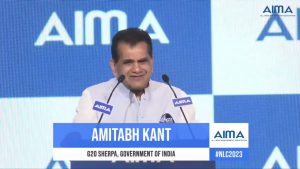India aims to become the world’s third-largest economy by 2027 through reforms like GST and digital initiatives, promoting growth in technology and sustainability, said Mr. Amitabh Kant, India’s G20 Sherpa, at AIMA’s 68th Foundation Day & 18th National Management Day.
India’s ambitious vision encompasses not only becoming the world’s third-largest economy by 2027 but also achieving remarkable growth through strategic reforms and technological advancements. Overcoming initial challenges like twin balance sheet issues and deficits, India has implemented significant reforms such as the Goods and Services Tax (GST), a modern bankruptcy law, and reduced corporate taxes, which have bolstered economic fundamentals.
India’s digital transformation has been marked by initiatives such as the Aadhaar-based financial inclusion drive, which has led to the creation of 500 million new bank accounts and the establishment of a robust digital payment ecosystem. This leap in technology has not only democratised access to financial services but has also empowered startups, catalysing rapid wealth generation and economic activity in tier 2 and tier 3 cities.
The widespread adoption of digital payments has significantly enhanced convenience and efficiency in financial transactions, contributing to inclusive growth and economic empowerment across diverse regions of the country.
Moreover, India’s technological advancements, exemplified by initiatives like the Unified Payments Interface (UPI), have set global benchmarks in efficiency and accessibility. The integration of digital infrastructure with artificial intelligence (AI) through platforms like the Jugalbandi app is democratising access to government schemes, particularly in rural areas. Unlike Western and Chinese models, India champions a public interest digital infrastructure that fosters innovation and global interoperability, transforming governance and economic empowerment.
In addition to advancing digitally, India is actively promoting sustainable development through substantial investments in renewable energy. Currently possessing a capacity of 185 gigawatts in renewables and initiatives such as providing clean cooking gas to millions of households, India is making significant strides towards global leadership in green energy.
The country’s ambitions extend to utilising renewable resources for green hydrogen production, aiming not only to decrease reliance on fossil fuel imports but also to position itself as a major exporter of clean energy solutions by 2047.
In essence, India’s journey embodies resilience, strategic foresight, and a steadfast commitment to sustainable and inclusive growth. As the nation strives towards ambitious goals, such as achieving a $35 trillion economy by its centenary in 2047, it serves as a compelling example of harnessing technology, fostering innovation, and embracing sustainable practices.
This approach not only aims to ensure prosperity for all its citizens but also underscores India’s role in contributing significantly to global advancement. Through these efforts, India seeks to establish itself as a beacon of economic progress and sustainable development on the global stage.
Watch the full Session- https://www.youtube.com/watch?v=ktjRBNyb0wo&t=7s




